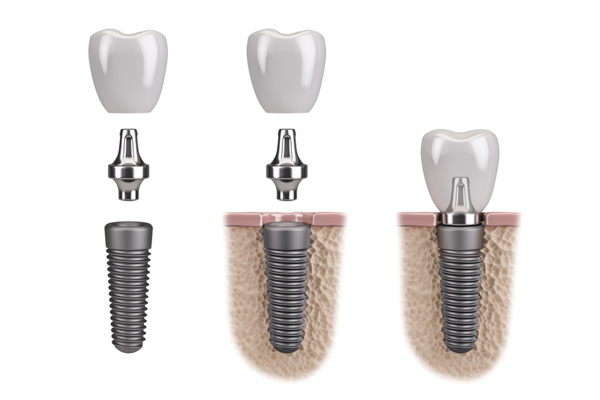A Dental Implant and the Possibility of a Needing Tooth Extraction

Before you get a dental implant, your dentist may tell you that you need to have a tooth extracted. While your permanent teeth were meant to last for your lifetime, there are sometimes reasons that one of your teeth may need to be removed. These reasons include infection and advanced gum disease. After a tooth has been extracted, the patient may receive a dental implant to replace the missing tooth. Read on to discover more about dental implants and tooth extraction.
Reasons for a tooth extraction
There are many reasons why a patient’s tooth may need to be extracted. One of the main reasons is because of infection. Sometimes, the decay in the tooth will extend completely to the pulp, which is the live part of the tooth. The pulp also contains the blood vessels and nerves.
A root canal can remove the infected pulp, but sometimes the infection is too severe. If a root canal or antibiotics cannot remove the infection, the tooth will need to be extracted so the infection will not spread to other parts of the mouth. This is especially true for patients who have weak immune systems. For example, patients who are having an organ transplanted or who are receiving chemotherapy may have weaker immune systems. The risk of getting an infection from a tooth can be reason enough to pull the tooth in this case.
Gum disease is another reason why a tooth may need to be extracted. Gum disease is an infection of the gums and the bones around the teeth. In the advanced stages, gum disease can cause the teeth to become loose. Sometimes, there is nothing more that can be done and the tooth will need to be extracted.
How tooth extractions work
Before the extraction, the dentist will work to numb the area with local anesthesia. Next, the dentist will grasp the tooth firmly with tools. The dentist will begin to gently rock the tooth back and forth until it becomes loose. When the tooth is loosened, the dentist will be able to pull it out of the patient’s mouth. Once the tooth is out, the dentist will place a piece of gauze over the area to stop the bleeding there.
Getting a dental implant after an extraction
After the tooth has been extracted, a patient may choose to receive a dental implant to replace the missing tooth. After the area has healed from the extraction, usually after a few weeks, the patient will be ready to receive the implant.
Visit a dentist today
Your dentist can help you decide if one or more of your teeth will need to be extracted. If so, you can choose to receive a dental implant to replace the missing tooth. This procedure can restore the function and appearance of your teeth. Your dentist can help you decide what the right type of implant is.
Request an appointment here: https://www.lilburnfamilydentistry.com or call Lilburn Family Dentistry at (770) 800-0178 for an appointment in our Lilburn office.
Check out what others are saying about our services on Yelp: Read our Yelp reviews.
Recent Posts
Dental implants are a permanent solution for replacing missing teeth and restoring oral function. Patients who take the time to understand the implant process enjoy successful outcomes.A dental implant is a titanium post that a dentist anchors to the jawbone to replace a missing tooth root. After the implant successfully integrates with the jawbone, the…
Seeing your family dentist for regular checks and treatments can maintain or improve your dental health. You can avail of basic treatments during your visits. Knowing what each one is can help you make informed decisions. Here are the common treatments that you can get from your family dentist.Cavities may worsen over time. Dental decay…
One of the most popular restorations for missing teeth is dental implants. However, that does not mean that they are appropriate for every patient. Under certain circumstances, implants may be contraindicated. If you are interested in this treatment, you should discuss with your dentist whether you are a candidate.The implant procedure involves multiple steps.A rod…
Dental implants are a way to replace a missing tooth in a way that looks and feels close to natural. Dental implant surgery is a multistep process, and it is important to know what to expect before you get started. You should speak with your dentist about whether implants are a good fit for you.…


